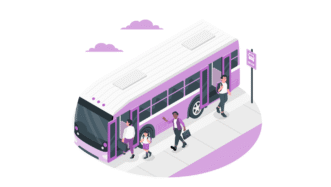LESSON OVERVIEW
This lesson focuses on the future of work. The big question here is whether robots will take over our jobs or not. During the lesson students will watch a short TED talk by A. Goldbloom called “The jobs we’ll lose to machines — and the ones we won’t”
The worksheet kicks off with a warm-up speaking task to introduce the topic in which students must discuss which professions have no future and which are on the rise. As the TED talk is only 5 minutes long this worksheet has two listening comprehension tasks: one for general understanding of the speech and second to practice listening for details. What follows is a short vocabulary gap-filling exercise to practice a few new words from the speech. The next stage has some speaking points to talk over the content of the speech. Finally, students will have to prepare and hold a debate on the key question: will machines steal our jobs.
With the recent development in AI/machine learning/voice recognition, I found that students have different opinions on the subject and the debate usually has to be stopped because we run out of time. Obviously, you can divide the class into smaller groups or hold a class-wide debate, let the students choose their sides or decide yourselves how to divide them or just turn the last task into a discussion topic. Whatever you do is up to you but I found that the warm-up and discussion tasks allow you to see how diverse opinions on the topic you have in the class and then choose your strategy appropriately.
WORKSHEETS
Subscribe to unlock these and many other Standalone lesson with the Premium plan
Subscribe












Great lesson content and staged. It is also appropriate to the level.
really bad lesson awful!
Can you be more specific in your feedback and tell us what you and your students didn’t like about it? It will definitely help us to improve our future lesson plans
The only drawback is the video. The speaker is indistinct at times and speaks too quickly, many students have difficulty grasping what is said. For the second, gap fill, listening, I stopped it after each sentence.
Thanks for the feedback! I agree that he does speak quite fast and it might be a bit challenging for learners but that’s the beauty of authentic materials – they reflect how people talk in real life.
Completely disagree with the comment about the Australian speaker being indistinct and speaking too quickly. More listening practice needed!
I don’t think that is the problem. That’s real English; the challenge is to expose learners to a variety of speaking style or accents. Let’s make sure we use the video for the right level.
Hi,
Can you update the lesson as the video was released in 2016 and the development of AI is really rocketing.
Thanks.
You’re right – we could look for a newer video! However, paradoxically, the situation hasn’t changed that much and all that was said by Anthony Goldbloom, the TED speaker, is still valid and the latest solutions, such as ChatGPT-4 operate with the same priniciples as described in that video.
We loved this lesson plan. The video was very interesting and the vocabulary also. It would be great to have an updated version as this is a little bit outdated now. Include Generative AI, and also a part on the moral and ethical side of AI would be an added bonus. Thank you
Hi Steven! Thanks for the comment. Really great to hear that you and your students enjoyed this lesson. And yes, it’s true, this lesson and the video \is from the pre-GenAI era, but we purposefully didn’t update this lesson but rather create new ones that focus more on GenAI, such as Have you met the new Dalí? or ChatGPT – a blessing or a curse? just to list lessons on the same level. Look for more AI-related lessons here.
Hi Stan, you’re right. There are more updated lessons I hadn’t realised. Maybe it would be a good idea to include the lesson date in the filter part of the website, along with the level and type of lesson.
Very nice site and extremely helpful on a tight schedule, by the way. Thanks a lot.